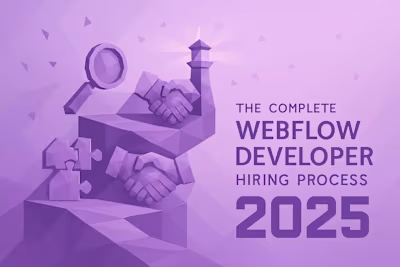The ROI of Hiring a Webflow Expert: Numbers That Will Surprise You

The ROI of Hiring a Webflow Expert: Numbers That Will Surprise You
Why ROI Matters for Webflow Projects
5 Surprising Factors That Boost ROI
1. Speed Gains
2. SEO Advantages
3. Conversion Upswings
4. Maintenance Savings
5. Design Credibility
Costs and Budget Insights
Tangible Results From Expert Collaboration
FAQs About Hiring a Webflow Expert
How much do Webflow experts charge?
Why does Webflow expertise matter vs. a general developer?
Can an expert handle advanced integrations?
Is it worth the investment for small businesses?
Moving Forward With Confidence
The ROI of Hiring a Webflow Expert: Numbers That Will Surprise You
I’ve worked on Webflow projects that took off in ways I didn’t expect—and others that quietly fizzled. The difference? It wasn’t just the design or the animations (though those help). It was how the project was scoped, planned, and connected to actual business goals.
As a freelancer, I’ve learned to ask questions that go beyond, “What do you want your homepage to look like?” Lately, the real conversations I’ve had with clients start with something more like: “What do you want this to do for your bottom line?”
Because when it comes down to it, most clients aren’t just looking for a prettier website. They’re looking for results—leads, conversions, time savings, momentum.
And that’s where ROI starts to matter.
Why ROI Matters for Webflow Projects
Return on Investment (ROI) is a simple calculation: how much you gain back compared to what you spent. For a Webflow project, that could mean increased revenue, lower costs, or time saved.
Looking at ROI early helps filter out distractions. It brings clarity to what matters most before a single line is designed or developed.
Planning for ROI also means setting measurable goals. These goals shape the direction of the project, the features you focus on, and even who you need to bring in to build it.
“It’s not about building fast—it’s about knowing why you’re building at all.” 💡
Without this kind of thinking, it’s easy to end up with a beautiful site that doesn’t actually move the needle.
5 Surprising Factors That Boost ROI
1. Speed Gains
Webflow’s no-code approach allows editors and designers to work in real time. This means fewer handoffs, faster iterations, and shorter timelines.
Projects that used to take months can now launch in weeks. That time saved translates into earlier user engagement and faster revenue generation.
“Time-to-market is a metric finance teams now ask about. Webflow has answers.”
A 2023 Forrester study found that businesses using Webflow experienced a 94% faster time-to-market compared to traditional platforms. Source
2. SEO Advantages
Webflow outputs clean HTML and CSS, which helps search engines crawl and index pages efficiently. It automatically generates sitemaps and supports structured data.
This built-in SEO foundation leads to better rankings without the need for extra plugins, especially for those working with Webflow Developers for SEO. Agencies have reported 15–30% increases in organic traffic after migration.
The easier it is to optimize, the more consistent the traffic growth becomes over time.
3. Conversion Upswings
Fast-loading pages and layout flexibility allow for better user journeys. Webflow experts can implement A/B testing and CRO strategies directly into the build process.
Real-world examples show 25–50% increases in form submissions and lead conversions after redesigns, especially with Webflow Developers for Lead Generation. Source
“Changing a button color isn’t strategy. But doing it based on data—and seeing a 3% lift? That’s worth tracking.”
A 1% improvement in conversion rate on a high-traffic site can mean hundreds of thousands in additional revenue annually.
4. Maintenance Savings
Traditional CMS platforms often require ongoing plugin updates, manual backups, and hosting management. Webflow handles those automatically.
This reduces the need for regular developer support and lowers monthly maintenance costs by up to 50%.
Fewer bugs, fewer hours billed, and fewer unexpected outages also contribute to long-term savings.
5. Design Credibility
Webflow allows for precision in layout, typography, and interaction design. This results in websites that feel polished, consistent, and purposeful, especially when working with Webflow Developers for Web Design.
A well-executed visual experience builds trust with visitors. It also supports brand storytelling without sacrificing performance.
Visual consistency across pages and devices reinforces credibility, especially for small businesses trying to compete with larger brands.
Costs and Budget Insights
Freelancers tend to charge between $20–$45 per hour for Webflow projects. Agencies typically range from $100–$150 per hour. The difference comes from overhead, team size, and bundled services.
A small project with a freelancer might land between $400 and $5,000. The same scope with an agency could range from $5,000 to $25,000 or higher. For large-scale builds or ongoing retainers, agency pricing can exceed $100,000.
“Freelancer math: $3,000 for a solid build. Agency math: $3,000 just for the kickoff call.” 😅
Freelancers often specialize deeply in Webflow and work solo or in small teams. This keeps costs lower and reduces layers of communication. Agencies bring in additional roles like SEO strategists, brand consultants, and QA testers—which increases the budget but can also increase speed and polish.
Projects that require advanced logic, integrations, or CMS complexity may benefit from a freelancer with niche platform skills, such as Webflow Developers for CMS. These experts often solve problems upfront that would otherwise cause delays or extra hours down the road.
Poor initial decisions—like building on the wrong CMS or ignoring responsiveness—can lead to rebuilds. In those cases, early mistakes cost far more than the hourly rate saved upfront.
Tangible Results From Expert Collaboration
Projects led by Webflow experts often show measurable performance improvements within the first 60–90 days. These include traffic gains, higher user retention, and increased internal efficiency.
One Forrester study found that companies using Webflow achieved a 332% ROI over three years, with a 94% faster time-to-market and 80% fewer hours spent on routine updates (source). These changes directly impacted how fast businesses could ship, test, and iterate.
On average, organizations working with Webflow experts reported 15–25% increases in organic traffic due to structured content, clean code, and native SEO features. In one case, Jasper AI achieved a 30% lift in search rankings, contributing to their Series A funding and $1.5 billion valuation.
Conversion rates also shifted. Epiq Solutions saw a 25% increase in form submissions with minor layout and UX adjustments. A 1% gain in conversions generated more than $600,000 in annual revenue.
“Sometimes, the most profitable change is just moving a button 30 pixels.” 🧠
Time saved on development is another return. Marketing teams reported up to 50% fewer tickets for routine changes, regaining 10–15 hours each month for other tasks (source). This reduced dependency on developers and sped up iteration cycles.
In terms of productivity, companies like Riverside.fm cut content update time by 65% by using Webflow’s CMS features and templated components (source). This allowed teams to reallocate resources to campaigns that drove revenue instead of backend maintenance.
Page speed also factored in. Jasper AI reached a 98/100 Google PageSpeed score, which lowered bounce rates by 18% and improved engagement across landing pages.
Each of these metrics—traffic, conversions, time-to-market—connects to bottom-line revenue. Teams that track these numbers before and after a Webflow implementation typically find a net positive return.
Calculating ROI from these inputs depends on the business model. A 2% increase in lead conversions may be worth $20,000 a year to one company, and $200,000 to another. The ROI is relative, but the pattern is consistent.
FAQs About Hiring a Webflow Expert
How much do Webflow experts charge?
Freelancers typically charge between $20 and $45 per hour, depending on experience and project complexity. On a project basis, costs range from $400 for a simple landing page up to $22,500 for multi-page sites with CMS, animations, and integrations.
“$3K from a freelancer vs. $30K from an agency—same platform, different layers.”
Agencies often price higher, with hourly rates from $100 to $150. Full-scope builds can range from $5,000 to $120,000 depending on scope, team roles, and timelines. Agency rates often include strategy, QA, and post-launch support as bundled services.
Why does Webflow expertise matter vs. a general developer?
Webflow experts understand the platform’s visual development system, CMS structure, and native interactions without relying on custom code. This results in faster builds, cleaner code, and fewer workarounds.
General developers may try to replicate Webflow features manually or through third-party tools, which adds complexity. Experts use platform-specific workflows like dynamic collections, CMS filters, and native animations to speed up delivery and reduce long-term maintenance.
Can an expert handle advanced integrations?
Yes. Webflow experts often work with tools like Zapier, Make, Memberstack, Outseta, Jetboost, and custom APIs, especially Webflow freelancers for Developer Platform. Some freelancers also handle JavaScript embeds, gated content, and dynamic forms.
“The person who built your homepage might also be the one wiring it to your CRM. That’s not always a bad thing.”
For multi-platform workflows, experts connect Webflow with CRMs like HubSpot or Salesforce, email tools like Mailchimp, and analytics dashboards like Google Tag Manager or Segment, often leveraging Webflow Developers for Analytics. Agencies typically assign developers or integrators for these roles, while freelancers may cover both design and development.
Is it worth the investment for small businesses?
Small businesses working with a Webflow expert can reduce launch times, improve site speed, and eliminate plugin issues. This allows for quicker testing of content and offers, which supports lead generation and brand credibility early on.
“A single page that loads fast, ranks well, and converts? That’s often enough to move the needle.” 🎯
Many freelancers tailor pricing for startups or local businesses. A $2,500–$5,000 investment often covers a small CMS-driven site with analytics, SEO foundations, and scalable templates. For many small teams, this replaces the need for ongoing developer support or agency retainers.
Moving Forward With Confidence
The ROI of hiring a Webflow expert is not abstract. It is quantifiable across time-to-market, conversion rates, organic traffic, and long-term maintenance savings. The data consistently shows that expert-led Webflow projects deliver financial gains that exceed their upfront investment.
Speed and efficiency are recurring patterns. Projects launch faster—by up to 94%—and updates require 80% less hands-on time. This allows teams to test offers, adjust content, and react to market conditions without developer bottlenecks.
Conversion improvements range from 1% to 50%, depending on the baseline and optimizations applied. These increases compound over time, especially for products or services with recurring revenue models. A 1% lift may equal hundreds of new customers annually.
Site credibility also plays a role. Pages that load quickly and follow a consistent design system tend to reduce bounce rates and increase trust. Jasper AI’s 98/100 Google PageSpeed score is a direct example of this correlation.
Freelancers often deliver these outcomes with lower overhead. Their rates are typically $20–$45/hour, compared to $100–$150/hour from agencies. For many small teams, this difference determines whether a project gets started at all.
Agencies may include broader teams and bundled services. Freelancers often bring platform fluency and tighter scopes. Both can produce returns, but the freelancer route offers more flexibility and direct collaboration. If you’re ready to hire Webflow experts, the results can exceed expectations.
Contra enables this collaboration without platform fees. Freelancers keep 100% of what they earn. Businesses avoid hidden markups. The result is a clear and direct exchange of value between client and expert.
“There’s no surcharge for working smart. Just clean math and good code.” 🧾
As of Apr 09, 2025, the economics of Webflow projects continue to tilt toward lean, expert-led teams with platform-specific knowledge. The ROI is no longer speculative—it’s documented, repeatable, and within reach.
Like this project
Posted Apr 10, 2025
The ROI of hiring a Webflow expert includes faster launches, higher conversions, and lower costs—see real numbers that may surprise you.








